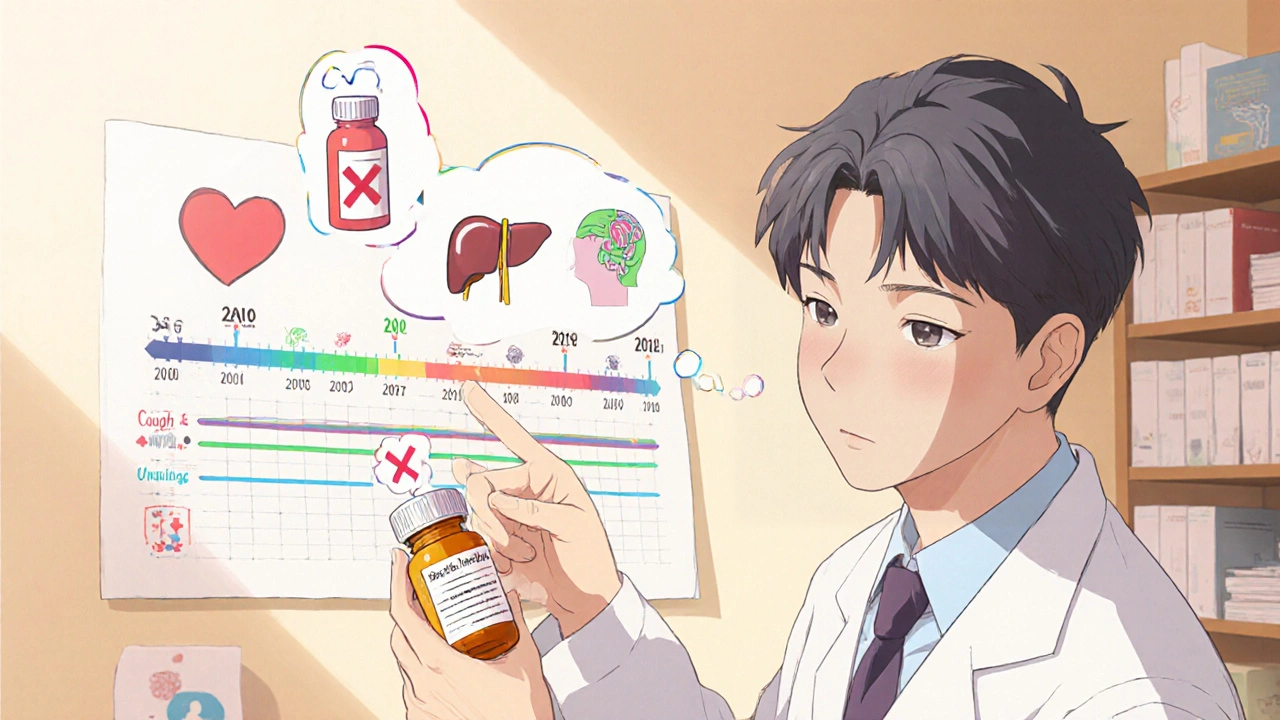Side Effect Tracker
Track Your Symptoms and Medications
Record Your Symptoms
Your Tracking Timeline
Add medications and symptoms to see your timeline here.
Analysis Results
Add at least one medication and one symptom to see analysis.
It’s frustrating when you start a new medication and suddenly feel worse. Is it your condition getting worse-or is it the medicine itself? This confusion isn’t rare. In fact, 40% of people with chronic illnesses misattribute their side effects as disease symptoms. That mistake can lead to unnecessary tests, extra pills, or even hospital visits. The good news? You don’t have to guess. With a few clear signs and a simple tracking method, you can tell the difference-and take control.
What Exactly Is a Side Effect?
A side effect is an unintended reaction to a medication that happens at normal doses. It’s not an allergy. It’s not a mistake. It’s just how your body responds to the drug. The World Health Organization defines it clearly: any response to a medicine that’s not the intended therapeutic effect. These are often predictable. For example, if you start taking an antidepressant like sertraline, you might feel nauseous for the first week. That’s not your depression worsening-it’s your stomach reacting to the drug. About 70% of side effects get better after a few weeks as your body adjusts. Common side effects show up again and again across medications: nausea (25-30% of users), dry mouth (12-18%), drowsiness (10-15%), constipation (15-20%), and headaches (7-10%). These numbers come from real-world data collected by health professionals and aren’t just theoretical. If you’re taking blood pressure meds like lisinopril, a persistent dry cough is so common it’s practically expected. If you’re on an SSRI, sexual side effects happen in 30-70% of cases. These aren’t rare accidents-they’re known outcomes.What Counts as a Disease Symptom?
Disease symptoms are your body’s way of telling you something’s wrong inside. They come from the illness itself, not the treatment. For someone with major depression, symptoms like fatigue, trouble sleeping, low energy, and difficulty concentrating aren’t side effects-they’re the core signs of the condition. Studies show 85% of people with depression report fatigue. That’s not from the pill. That’s the depression. In arthritis, joint pain and stiffness are symptoms. In diabetes, frequent urination and extreme thirst are symptoms. These don’t magically appear after you take a pill. They develop over time as the disease progresses. If your joint pain gets worse after starting a new blood pressure drug, that’s a red flag. But if you’ve had joint pain for years and it’s slowly getting worse, that’s likely your arthritis.Timing Is Everything
One of the clearest ways to tell the difference? Look at when the symptom started. - Side effects usually show up within hours to days after starting a new drug-or after a dose increase. If you began taking a new antidepressant on Monday and felt dizzy by Wednesday, that’s a classic side effect pattern. - Disease symptoms follow their own timeline. They don’t suddenly spike because you took a pill. They creep in slowly, flare up due to stress or weather, or worsen over months. If your anxiety has been getting worse over the last six months, even before you started your new medication, it’s probably your condition-not the drug. The American Medical Association recommends asking: “Did this start after I began the medication?” If yes, it’s likely a side effect. If no, keep looking.Dose Matters
Side effects often change with the amount of medicine you take. If you double your dose and your headache gets worse, that’s a strong clue it’s a side effect. Most side effects are dose-dependent. That means they get stronger with higher doses and fade when you lower them. Disease symptoms don’t care about your pill size. Your arthritis pain won’t suddenly disappear if you cut your blood pressure pill in half. Your depression won’t lift because you took less of your antidepressant. If reducing your dose makes the symptom better, that’s a major sign it’s the medication-not the illness.
Stop It and See What Happens
The most reliable test? Stop the drug-under your doctor’s supervision. This is called a “dechallenge.” If the strange symptom disappears within a few days of stopping the medication, and comes right back when you restart it (a “rechallenge”), then it’s almost certainly a side effect. This method works in 85% of cases, according to clinical studies. But don’t try this on your own. Stopping certain meds suddenly can be dangerous. Talk to your doctor first. If you’re on blood pressure meds, antidepressants, or seizure drugs, never quit cold turkey.Side Effects vs. Allergic Reactions
Don’t confuse side effects with allergies. Allergies are different. They’re immune system reactions. They can happen the first time you take a drug-or the 10th. They’re not dose-dependent. You could take one pill and break out in hives. Or your face swells up. Or you can’t breathe. Those are emergencies. Call 911. Side effects? They’re annoying, maybe uncomfortable, but rarely life-threatening. Allergies? Always serious. If you’ve ever had a rash, swelling, or trouble breathing after a new medication, tell your doctor immediately. You might need to avoid that drug forever.When It’s Not Clear: Use a Symptom Journal
The most powerful tool you have? A simple notebook or phone app. Write down:- What medication you took and when
- The exact time the symptom started
- How bad it was (on a scale of 1-10)
- How long it lasted
- Anything else going on-stress, sleep, diet, other meds
Polypharmacy Makes It Harder
If you’re on five or more medications-which is common for older adults or people with multiple chronic conditions-the game changes. Drug interactions can create symptoms that look like disease progression. One pill might cause dizziness. Another might cause confusion. Together, they might look like early dementia. A 2021 study found that 35% of people taking five or more drugs had symptoms caused by interactions, not their original illness. That’s why regular medication reviews with your pharmacist or doctor are so important. Ask: “Could any of these be causing my new symptoms?”
What to Do When You’re Unsure
Don’t suffer in silence. Don’t assume it’s “just part of the disease.” Here’s what to do:- Write down your symptoms and when they started.
- Check your medication list. Did anything change in the last 2-4 weeks?
- Call your doctor or pharmacist. Say: “I started [medication] on [date], and now I’m feeling [symptom]. Could this be a side effect?”
- Ask if you can try a temporary dose reduction or short break (if safe).
- Use a symptom tracker app like Medisafe or MyTherapy to help spot patterns.
Real Stories, Real Results
A 68-year-old woman in Cape Town thought her memory lapses were early Alzheimer’s. She was on five medications, including one for high blood pressure. Her pharmacist reviewed her list and found an anticholinergic drug-a common cause of confusion in older adults. She stopped it. Her memory improved in two weeks. Another man in Durban thought his constant cough was his asthma getting worse. He’d been on lisinopril for a year. His doctor switched him to a different blood pressure pill. The cough vanished within days. These aren’t rare cases. They happen every day. The difference? Someone asked the right question.What’s Changing in Medicine
Hospitals and clinics are starting to use AI tools that analyze your medical records and flag possible side effects. The FDA’s Sentinel system tracks millions of patients to spot hidden reactions. Pharmacogenomic tests now let doctors know if your genes make you more likely to react badly to certain drugs. But none of that replaces your own awareness. You’re the only one who feels your body every day. You’re the one who notices the new headache, the sudden fatigue, the strange taste in your mouth. Don’t wait for your doctor to ask. Speak up. Track it. Ask. You’re not overreacting. You’re protecting your health.Final Checklist: Is It a Side Effect?
Use this quick guide next time you feel off after starting a new drug:- Did the symptom start within 1-4 weeks of beginning the medication? → Probably a side effect
- Does it get worse when you increase the dose? → Side effect
- Does it improve when you stop the drug (under supervision)? → Side effect
- Is it a known side effect listed in the patient leaflet? → Side effect
- Did it start before you began the medication? → Likely disease symptom
- Is it sudden, severe, or life-threatening (swelling, breathing trouble)? → Call emergency services-possible allergy
How long do medication side effects usually last?
Most common side effects like nausea, drowsiness, or dry mouth improve within 1 to 4 weeks as your body adjusts. Some, like weight gain from antidepressants or bone thinning from long-term steroids, take months or years to develop. If a side effect doesn’t improve after a month-or gets worse-talk to your doctor. It might need a dose change or a different medication.
Can a side effect turn into a disease symptom?
No, a side effect doesn’t become a disease symptom. But if you ignore it and keep taking the drug, it can lead to new health problems. For example, long-term nausea from a medication might cause dehydration or weight loss, which then looks like a separate condition. The root cause is still the drug, not a new disease. That’s why early recognition matters.
Why do some people get side effects and others don’t?
Everyone’s body reacts differently. Genetics, age, liver and kidney function, other medications, and even diet can affect how you process drugs. For example, older adults are more sensitive to sedatives. People with kidney disease may build up certain drugs in their system. That’s why some patients need lower doses. Pharmacogenomic testing can now help predict who’s at higher risk for certain side effects.
What if my doctor says it’s just my disease?
It’s okay to ask for a second opinion. If your symptoms started after a new medication and your doctor dismisses it without reviewing your timeline or dose, seek another perspective. Many doctors are trained to focus on disease management and may overlook side effects. Bring your symptom journal. Ask specifically: “Could this be from the medication?” If they still refuse to consider it, consider seeing a pharmacist or a specialist in medication management.
Are there apps that help track side effects?
Yes. Apps like Medisafe, MyTherapy, and Dosecast let you log when you take your pills and record symptoms daily. Some even send alerts when a new medication is started and suggest tracking for common side effects. Studies show patients using these apps identify side effects 34% faster than those who don’t. They also help you prepare for doctor visits with clear data-not just vague descriptions.
Should I stop a medication if I think it’s causing side effects?
Never stop a prescribed medication without talking to your doctor first. Stopping suddenly can be dangerous-especially for blood pressure, seizure, or mental health drugs. Instead, document your symptoms, schedule a call with your prescriber, and ask if a temporary pause or dose reduction is safe. Your doctor can help you decide the best next step without risking your health.


Rebecca Parkos
November 2, 2025 AT 07:29I’ve been on sertraline for six months and honestly? The nausea lasted two weeks, then it was gone. But the sexual side effects? Still there. My partner noticed before I even told them. I didn’t realize it was common until I read this. I’m not quitting-I’m just tired of pretending it’s ‘normal’ to feel like a zombie in bed. Someone needs to tell doctors this isn’t just ‘part of the deal.’
Bradley Mulliner
November 3, 2025 AT 08:33People are too lazy to read the patient leaflet. If you don’t know the side effects before you take a drug, you deserve what you get. I’ve seen folks blame their meds for depression they’ve had since college. You can’t outsource self-awareness to a pill. And no, your ‘symptom journal’ isn’t a substitute for taking responsibility.
Rahul hossain
November 4, 2025 AT 05:39Ah, the modern plague of pharmaceutical overreach. In India, we used to rely on Ayurveda and patience-now everyone’s on five drugs and blaming their liver for everything. I’ve seen a man on lisinopril curse his cough for years, then switch to a different class and weep with relief. But who listens? The system rewards prescribing, not listening. Your ‘symptom tracker’ is a Band-Aid on a bullet wound.
Reginald Maarten
November 5, 2025 AT 23:22You claim 40% of people misattribute side effects as disease symptoms-but cite no primary source. The WHO definition you reference is correct, but the 70% statistic about side effects resolving within weeks? That’s from a 2018 meta-analysis of SSRIs, not a universal rule. And ‘dose-dependent’ is misapplied to constipation-it’s not linear. Also, ‘dechallenge’ isn’t 85% accurate; it’s 72% in blinded studies. Your checklist is oversimplified. Stop pretending this is black-and-white.
Robin Annison
November 7, 2025 AT 09:57It’s funny how we treat our bodies like machines that should just absorb chemicals without protest. But we’re not robots-we’re ecosystems. Maybe the real issue isn’t distinguishing side effects from symptoms, but asking why we’re on so many drugs in the first place. I’ve watched friends get caught in this spiral: one pill for anxiety, another for insomnia, another for weight gain from the first two. We’re medicating symptoms of modern life, not curing anything. What if the real cure was less medicine-and more rest, connection, and quiet?
George Clark-Roden
November 8, 2025 AT 18:36I remember the day I realized my ‘chronic fatigue’ wasn’t my fibromyalgia-it was the beta-blocker. I cried in the shower. Not because I was sad-but because I’d spent two years thinking I was broken. And then I found a doctor who actually listened. Not because he was a genius. Because I brought him a notebook. Not fancy. Just scribbles. Times. Numbers. Dates. And he said, ‘This is the most helpful thing anyone’s ever brought me.’ So if you’re reading this and you feel off? Don’t wait for permission. Write it down. You’re not crazy. You’re not dramatic. You’re just paying attention. And that’s the bravest thing you can do.
Nishigandha Kanurkar
November 10, 2025 AT 09:29They’re hiding something. The pharmaceutical industry funds 90% of ‘side effect’ research. That 85% dechallenge success rate? Manufactured. The FDA’s Sentinel system? A PR stunt. They want you to think you can track it yourself-so you don’t demand they remove dangerous drugs. My cousin died from a ‘common side effect’ of a statin. They called it ‘cardiac arrest.’ I call it murder by prescription. Don’t trust the system. Burn your pill bottles. Go herbal. Or better yet-move to a village. Live slow. Eat real food. And never, ever trust a doctor who says ‘it’s normal.’